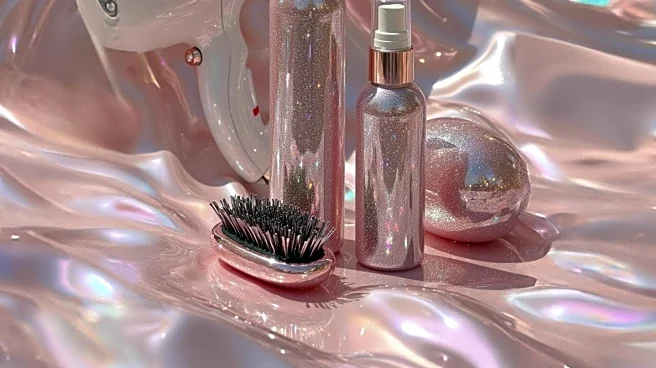What's Happening?
A new trend on TikTok is encouraging individuals to dye their hair to match their skin tone, a concept that resurfaces in the beauty industry every few years. Travis Ogletree, a Los Angeles-based colorist,
notes that this trend, reminiscent of Naomi Campbell's caramel hair phase, is gaining popularity again. The trend involves selecting hair colors that are close to one's skin tone but with added dimension to avoid a flat appearance. Experts like James Claytor and Calisti emphasize the importance of choosing shades that complement one's complexion, such as golds and coppers for warm skin tones, and ash and mocha for cool skin tones. They advise that this type of dye job is best performed by professionals who can accurately assess and enhance one's natural tones.
Why It's Important?
The resurgence of this hair dye trend highlights the influence of social media platforms like TikTok in shaping beauty standards and practices. It underscores the importance of professional guidance in achieving aesthetically pleasing results, as improper color choices can lead to unflattering outcomes. This trend also reflects broader societal shifts towards personalized beauty, where individuals seek to enhance their natural features rather than conform to one-size-fits-all standards. The trend's popularity among Black women and those with warm to medium skin tones suggests a growing appreciation for diverse beauty expressions.
What's Next?
As the trend continues to gain traction, it is likely that more individuals will seek professional advice to achieve the desired look. Hair salons may see an increase in demand for consultations and dye jobs tailored to individual skin tones. Additionally, beauty brands might develop products specifically designed to complement various skin tones, further expanding the market for personalized beauty solutions. The trend could also inspire new content on social media platforms, as influencers and beauty enthusiasts share their experiences and tips.
Beyond the Headlines
This trend raises questions about the cultural implications of beauty standards and the role of social media in perpetuating certain aesthetics. It challenges traditional notions of beauty by promoting a more inclusive approach that celebrates individual differences. The trend also highlights the potential for social media to democratize beauty advice, allowing diverse voices to influence mainstream practices. As more people embrace this trend, it could lead to a broader acceptance of varied beauty expressions and a shift away from homogenized ideals.









